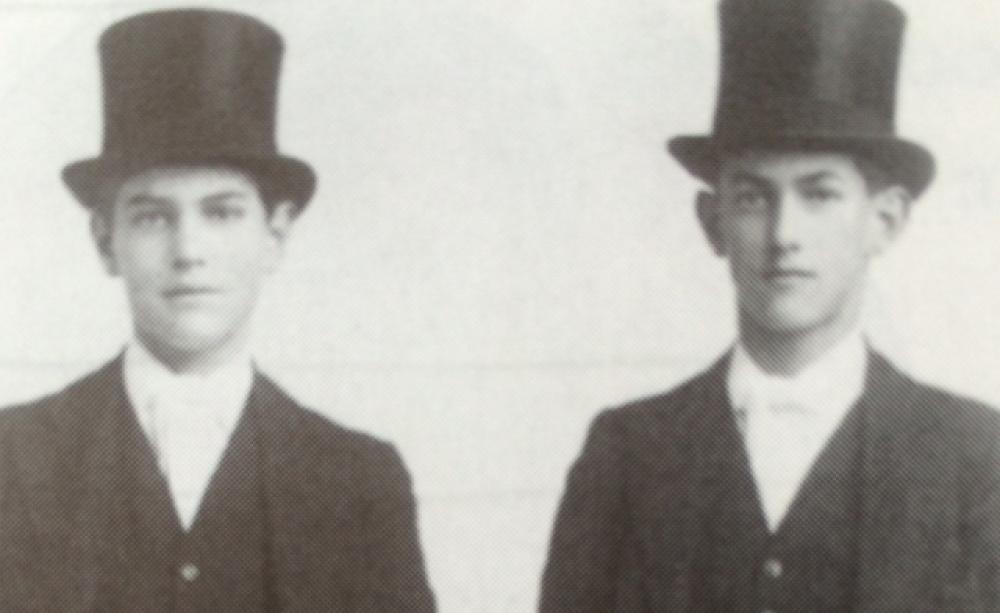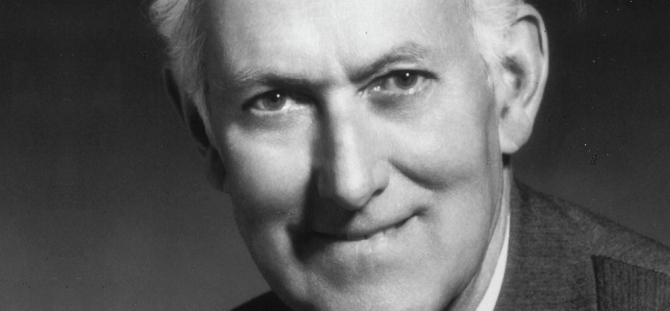-
Brothers Basil Fisher (left) and Antony Fisher (right) as students at Eton.
[Image source. Click image to open in new window.]
Sir Antony Fisher.
[Image source. Click image to open in new window.]
Sir Antony George Anson Fisher AFC (28 June 1915 -- 8 July 1988), nicknamed AGAF, was a British businessman and think tank founder. Antony Fisher participated in the formation of various libertarian [a political philosophy and movement that upholds liberty as a core principle] organisations during the second half of the twentieth century, including the Institute of Economic Affairs, and the Atlas Network. Through Atlas, Antony Fisher helped establish up to 150 other institutions worldwide.
Early life
Antony Fisher was born on 28 June 1915. Antony Fisher was only two years old when his father was killed by a sniper in Gaza during World War I.
Antony Fisher was educated at Eton College. Antony Fisher graduated from Trinity College, Cambridge with a degree in engineering. During the Second World War, Antony Fisher served as a fighter pilot in the Royal Air Force., being awarded the Air Force Cross.
Air Force Cross (United Kingdom)
The Air Force Cross (AFC) is a military decoration awarded to officers, and since 1993 other ranks, of the United Kingdom Armed Forces, and formerly also to officers of the other Commonwealth countries. It is granted for "an act or acts of exemplary gallantry while flying, though not in active operations against the enemy". A bar is added to the ribbon for holders who are awarded a further AFC.
Career
After World War II, Antony Fisher was alarmed by the election of a Labour government, the nationalisation of industry, and the introduction of central economic planning. In 1945, Fisher had read "Road to Serfdom" by Austrian economist Friedrich A. Hayek which influenced his thinking. Fisher sought out Hayek at the London School of Economics where he taught and talked about his plans to go into politics. Hayek, however, convinced Antony Fisher that think-tanks were the best medium for effecting political change.
In 1952, Antony Fisher undertook a study trip to the United States, where he visited the new Foundation for Economic Education. Floyd Arthur "Baldy" Harper [F.A. Harper] of the Foundation for Economic Education introduced Fisher to former colleagues from the Agriculture Department of Cornell University in Ithaca, New York, who showed him intensive chicken farming techniques. Fisher was very impressed and returned to start England's first battery cage chicken farm, "Buxted Chickens," which eventually made him a millionaire.
In 1955, Antony Fisher used his fortune to set up the influential Institute of Economic Affairs [Britain] with Ralph Harris.
Some of Fisher's other business ventures did not succeed (including a turtle-farming operation).
In 1971 Fisher founded the International Institute for Economic Research, which went on to spawn both the Atlas Network in 1981 and the International Policy Network in 2001. Through these operations, Fisher provided financial and operational support for a huge number of fledgling think-tanks, most of which would not exist without his influence. It was through the Atlas Network that Fisher was able to extend his beliefs worldwide. By 1984, Fisher was watching over eighteen institutions in eleven countries. As of 2017, Atlas supports and works with nearly 500 free-market think-tanks in over 90 different countries.
In his book "Thinking the Unthinkable," Richard Cockett sketched Fisher's role in supporting other emerging think-tanks around the world. Cockett wrote,
"On the strength of his reputation with the Institute of Economic Affairs (IEA), Antony Fisher was invited in 1975 to become co-director of the Fraser Institute in Vancouver, co-founded by the Canadian businessman T. Patrick Boyle in 1974. Fisher let the young Director [co-Founder] of the Fraser Institute, Dr. Michael Walker, get on with the intellectual output of the Institute (just as Antony Fisher had given free rein to Seldon and Harris at the IEA) while Antony Fisher himself concentrated on the fund-raising side."
Richard Cockett explained that after his success at the Fraser Institute, Fisher went to New York where in 1977 he set up the International Center for Economic Policy Studies (ICEPS), later renamed the Manhattan Institute.
"The incorporation documents for the ICEPS were signed by prominent attorney Bill Casey [William J. Casey], later Director of the Central Intelligence Agency." Cockett comments that "under the directorship of William Hammett the Manhattan Institute became probably Fisher's greatest success after the IEA."
In 1977, Cockett wrote, Fisher moved to San Francisco "with his second wife Dorian, who he had met through the Mont Pelerin Society, and founded the Pacific Research Institute in 1979." Antony Fisher and Milton Friedman lived in the same apartment block in San Francisco during the 1980s. In the late 1970s, Fisher assisted Greg Lindsay in the development of the Centre for Independent Studies in Sydney. Cockett wrote, "In 1981, to co-ordinate and establish a central focus for these institutes that Fisher found himself start up all over the world, he created the Atlas Economic Research Foundation which in 1987 joined up with the Institute for Humane Studies (IHS) (founded by the Mont Pelerin Society member F.A. Harper in 1961) to provide a central institutional structure for what quickly became an ever-expanding number of international free-market think-tanks or research institutes." According to Cokett, "Fisher used the local and international gatherings of the Mont Pelerin Society to find personnel, fund-raisers and donors for many of the Atlas Institutes" as the international think-tanks proliferated.

